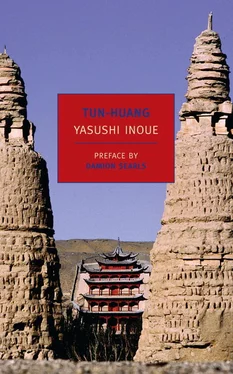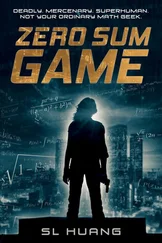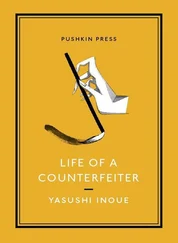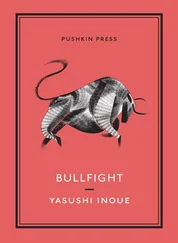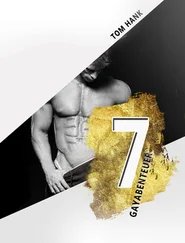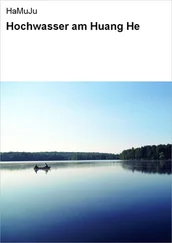“What is there to do? Do you think that something can be done?” Yen-hui asked reproachfully. “While we were in Kua-chou, we still had Sha-chou to run to. But now there’s no place we can escape to. The Hsi-hsia are coming from the east and the Muslims from the west. There’s nothing I can do but sit here in this chair.”
And he was right. This unnecessarily large chair which he now occupied, and which he had sat in for the past two or three days, was, he was sure, the last throne which heaven would grant him on this earth.
Hsing-te left Yen-hui’s room and went into the inner recesses of the palace. Unlike Yen-hui’s chamber, each room was in utter confusion with the packing of household furniture and valuables. In each of these rooms a member of the Ts’ao family was supervising a group of people who worked tirelessly.
Hsing-te learned from one of the men that they were planning to leave that evening for Qoco in the northwest. He again returned to Yen-hui’s chamber.
“You’ve just seen how my family is frantically working to save their lives and valuables, haven’t you?” Yen-hui greeted him. “But all that is useless. Tell me, where in the world do they think they can escape to? Even if they should escape, what good will their lives and treasures be to them? The Ts’ao dynasty will fall, the sutras will burn, and the city will be razed. Soon the flames which destroyed Kua-chou will also swallow up this town. Do you remember those red flames? The color of those hungry flames which danced up toward heaven?”
Yen-hui spoke tremulously, in the manner of a prophet. Hsing-te suddenly recalled vividly the flames he had seen when they left Kua-chou. The same kind of fire was certain to strike Sha-chou tonight, and most likely would destroy the Ts’ao dynasty, burn the sacred scrolls, and raze the town.
It was impossible to ask Wang-li to renounce his consuming desire to destroy Yüan-hao. The town would burn, the treasures would disappear, and the Ts’ao rule would end. There was nothing that could stop this.
But, Hsing-te thought, perhaps he might save the sutras. He couldn’t rescue anything else, but it might be possible to save the sacred works.
Material goods, life, and political power belonged to those who possessed them, but the sutras were different. They belonged to no one. It was enough that they should not disappear in flames — that they should just continue to exist. The mere fact that they survived was of value in itself.
Suddenly, Hsing-te was beset with thoughts of eternity. He was moved by powerful and deep feelings. If he could protect the sutras from the flames, he would do so. Even if he could not save all of them he should rescue as many sacred scrolls as possible from the flames. He had to do this for the sake of the three young monks, too.
Hsing-te stood with a set expression on his face. The secret holes in the Thousand Buddha Caves mentioned by Kuang suddenly took on a new, vital significance. He abruptly turned around and left Yen-hui’s chamber and hurried through the palace, then toward the square where the troops had assembled earlier.
When he reached the square, he cut across it and soon spied Kuang and his group, camped in the same place as the previous night. Hsing-te approached Kuang, who was seated near a campfire.
Kuang was in a very ugly mood. “There were so many people making a racket at dawn that they woke me up. No matter how much they rush around, there’s no chance of their winning with those soldiers. Well, this is the end of the city!” Without warning, he spat out these words. “What are they up to at the palace?” he said, obviously put out because no one had come from there to entrust him with their valuables.
“It’s a madhouse with all the packing,” replied Hsing-te.
“Packing?” Kuang’s eyes glittered.
“That’s right, they’re packing, but no one is thinking of depositing the goods with you. The Ts’ao family is planning to leave this evening for Qoco.”
“What!” Kuang stood up abruptly and swung his arms furiously around. Then he said, “So they can’t trust Kuang. Those bastards! All right, if that’s the way they feel about it, then just wait and see. One step outside the town and they’re in the desert!” His violence indicated that he himself might not be above becoming highwayman, even before the Asha and Lung tribesmen had had a chance.
“Don’t shout like that! Just hear me out. Even if you should rob the Ts’ao family in the desert, you, in turn, will be attacked by the Hsi-hsia. The Hsi-hsia army has already encircled the city. Needless to say, they are in the east and they are also camped in the north, west, and south. Now listen! I’ll arrange it so that you’ll store most of the valuables for the Ts’ao.”
Kuang’s expression hardened and he asked, “Can you really do it?”
“I’m telling you this because I can. I’ll bring the goods here this evening.”
“Evening? Can’t you make it a little earlier?”
“No. This evening is the best I can do,” Hsing-te declared. He was thinking about the storeroom in the Great Cloud Temple, where he had been the night before, and of the vast number of sacred books which filled the room. Naturally, he wanted to bring out as many Buddhist scrolls as possible from the other temples as well.
“The more camels you have, the better it will be. You’ll probably need a hundred.”
“Right now I have eighty. I’ll arrange to get twenty more by then, and will try my best to have a hundred.”
Kuang said that he would also send men immediately to the Thousand Buddha Cave to locate two or three more secret enclosures.
Hsing-te parted from Kuang, returned to his headquarters and, with several soldiers accompanying him, went to the Great Cloud Temple. The three monks were still working on the scrolls and documents in the storeroom.
When Hsing-te entered the room with his men, the three monks instinctively braced themselves. They apparently had thought that the enemy had arrived. In a single night their eyes had sunk, and yet those eyes flashed with a strange cold light. Hsing-te explained to the three men his plan to take these sutras to the Thousand Buddha Cave and bury them in secret enclosures. He explained that by doing this he could safeguard them from plunder and fire.
The three monks stared at Hsing-te as if they were looking right through him. Seeing no pretense or deception, they looked at each other and sat down. It was clear that Hsing-te’s proposal was an unexpected answer to their prayers.
Hsing-te instructed the men to pack all the sutras in the storeroom in boxes by evening so that they could be easily loaded onto camels, then to bring those boxes to the loading area and not to breathe a word about the contents to the camel drivers. The three monks, with several new helpers, proceeded to carry the sacred scrolls from the ancient building to the open space that was now bathed in the white winter sun.
Watching the men at their work, Hsing-te departed and went once more to the palace. He met again with Yen-hui, who remained sitting apathetically. Through the ruler’s intervention, Hsing-te was led to the conference room where the abbots had been meeting for the past few days.
Hsing-te dismissed his guide at the entrance of the room and opened the door. A strange sight met his eyes. Several monks were lying on the floor in various postures. They appeared to have collapsed, but they were not dead — only in deep slumber.
Hsing-te woke an abbot lying near-the entrance and explained the measures he had planned to save the Buddhist scriptures and asked the abbot’s opinion. The abbot, who appeared to be a man of almost seventy, replied that, as Hsing-te could see, the monks were all asleep. They would sleep until evening and then would continue their meeting. At the evening conference he would present Hsing-te’s proposal and ask the opinion of the others. Also, since the number of abbots from the seventeen temples had gone down to five, their view would represent those of only five temples and not seventeen. He wanted Hsing-te to know this in advance. The five temples of the remaining five abbots were the Kai-yuan, Kan-yuan, Lung-hsing, Ching-t’u and Pao-en temples. Over five hundred monks, nuns, and Buddhist novices had already left the city.
Читать дальше
